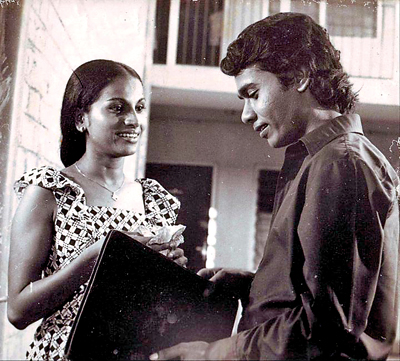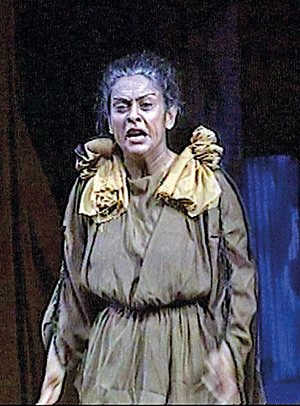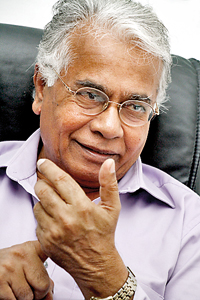In defence of art as a social reality

Hansa Vilak: Breaking ground with first cinematic venture
While Dr. Lester James Peries called Dharmasiri Bandaranayake’s maiden cinematic labour, Hansa Vilak a ‘dazzling debut’ which ‘displays a remarkable feel for the medium’ and ‘imaginative, experimental and very exciting,’ scholar and critic Reggie Siriwardene lauded him for ‘a form and style which went further than any Sinhala film before in taking us into the world of inner psychological experience.’ To have found ‘the means of reflecting through the form and techniques of the film, the pressures of society and the family in the mind of a bewildered and tormented individual is Dharmasiri Bandaranayake’s great achievement,’ Reggie Siriwardene wrote.
In Bandaranayake’s own words, “Hansa Vilak is a slice of my own life.” Having played Nissanka in the film, Bandaranayake cannot fathom even after three decades and more that it was his own work of direction and his own portrayal of a man entangled in the web of love, lust and loss. This self-wonder is what sets his Suddilage kathawa, Thunweni yamaya, Bawa duka and Bawa karma apart from his ‘dazzling debut’, he says. “If I’m to do a film again, I will certainly pick up from where Nissanka left and walk with him till his end.” Would he play the world-weary Nissanka today, put on trial by life? “Why not?” he is quick to reply!
Dharmasiri Bandaranayake was picked by Dayananda Gunawardene as a 17-year-old to play ‘Premadasa’ in his maiden cinematic effort, Bakmaha Deegaya, an adaptation of the French drama, Marriage of Figaro. For young Bandaranayake, it was more than being infatuated by lamatheni! (played by Irangani Serasinghe). It marked his film debut as an actor followed by his lead role as Sarath in Wasantha Obeysekere’s Palagetiyo.

Anoja Weerasinghe in the theatre production of The Trojan Women
From Dayananda Gunawardene’s Bakmaha akunu as a schoolboy (which inspired his film Bakmaha deegaya later) to his own production Trojan Women as a feted dramatist, Bandaranayake’s journey had been a ‘bitter-sweet’ one. The ‘sweetness’ of this theatrical journey is attributed to his formative years as a young artiste during
which he was mentored by the top brass in the industry including Henry Jayasena, Sugathapala de Silva and Bandula Vithanage. It is bitter, says Bandaranayake who mourns the ‘cultural vacuum’ which arose with the demise of the parting veterans and the eroding social setting for theatre and cinema. “We will not find another Lester whose life was cinema and cinema alone, nor will we find another Sarathchandra who translated Maname and Sinhabahu to a social dialogue,” he reflects.
Accolades and stardom do not move Bandaranayake. The Colombo International Theatre Festival this year which unfolds from May 24 – 30 is in his honour and he is only humbled. The quest for universality in theatre transcending ‘class’ and ‘language’ barriers is an ardous journey, says the dramatist. This, he has achieved with finesse and in style. Be it Eka adhipathi, Makarakshaya, Yakshawagamanaya, Dhawala bheeshana or Trojan Women, a full-house in any theatre speaks for the fact. “My focus is on expression,” notes the dramatist in whose hands, Hecabe and Cassandra transcend Greek borders to become our own war-time women.
Whether this all-time ‘validity’ of his productions has made Bandaranayake ‘complacent’ in his movie-making and theatre undertakings is often raised. To this he responds candidly: “It’s a mismatch. If I have a good script, I cannot afford it financially and if there is willing financial assistance, I need to become a pawn.” If it’s win-win, he will certainly do it all over again, he says.

Dharmasiri Bandaranayake. Pic by Indika Handuwala
Bandaranayake was credited for his ‘reconciliation-centric’ documentaries long before reconciliation became a buzz word. For him, documentary-making is an ‘intermission’ in his cinematic career. The next phase of his much sought-after political documentary ‘Paradise in Tears’ keeps him busy these days. A man mooting the acceptance of ‘common roots’ and ‘social realities’, he questions if reconciliation is ever possible in a fabric shrouded with hypocrisy. “The education system today had made a generation of ‘heartless’ future citizens, oblivious to tragedies around them. It is a double tragedy when theatre remains insensitive to them,” maintains the dramatist asking if anyone ever came forward to translate the recent tragedies of Rathu Paswala, Salawa or Meethotamulla. “Be it theatre, cinema or any form of art, it needs to be people-centric. It is the fundamental,” he says.
The Colombo International Theatre Festival being held to felicitate Dharmasiri Bandaranayake features 12 plays from Sri Lanka, Italy, India, Kosovo, Turkey, Argentina, Austria and Germany to be staged at the Lionel Wendt along with Workshops at the Indian Cultural Centre and an international directors’ conference, the Colombo Theatre Forum at the Goethe Institut. For more details see www.citfsrilanka.com and on facebook: https:/web.facebook.com/CITFSriLanka/


